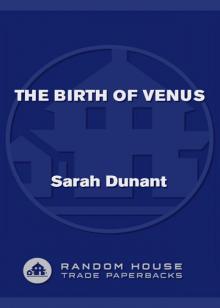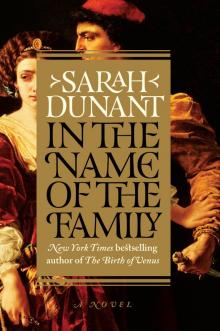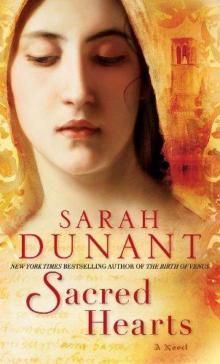- Home
- Sarah Dunant
Blood & Beauty: A Novel of the Borgias Page 5
Blood & Beauty: A Novel of the Borgias Read online
Page 5
This then is Borgia Rome; a city where a traveller entering the gates must still cross acres of country before he reaches the centre, where animals still outnumber citizens, goats and cattle grazing the imperial ruins, their insistent teeth pulling weeds – and mortar – from between the stones of history. A city still struggling with a chasm of hardship between rich and poor, still ripped apart by gross family violence. But also a place of growing magnificence and confidence where, for the first time in centuries, the future no longer looks bleaker than the past, and where the new pope has chosen for himself a name designed to foster a belief in magnificence again.
Alexander the great… Alexander the warrior…
His first job as head of the Church is to dispatch a number of errant souls to eternal judgement. The mayhem following the old pope’s death has delivered hundreds of corpses to the morgue and the city has grown accustomed to lawlessness. He increases the Papal Guard, makes it illegal to buy or sell arms without a papal licence and speeds up the judging process. When caught, many of the wrongdoers are strung up from gallows built in the ashes of their own houses, smoke plumes of summary justice rising high into the air.
To show that he is fair as well as ruthless, he personally inspects the city jail, then throws open the great salon of the Vatican palace one day a week to take petitions from ordinary citizens. The people flock inside: it is a long time since they have had a pope able to sit upright on his throne, let alone one so glowing with health and energy. Clothed in lustrous velvet (and a cap which fits his large head perfectly), he listens, deliberates, fine-picks the arguments and delivers his summations: a Solomon as well as an Alexander, with a voice as resonant as a church bell. Even those who lose come out satisfied.
The heavier labour he leaves to others: mules, carts, servants bowed under the weight of tapestries, bedsteads, chests of gold plate and majolica and great coats-of-arms of the Borgia bull. As his old palace empties from one door, it fills up through another. Cardinal Ascanio Sforza is the new vice-chancellor and the office of the job will now become his home.
Those he cannot win with favours he woos with good behaviour. In the first weeks the Vatican sees no instant invasion of Spanish freeloaders as was feared. Most particularly, his adored children are noticeable by their public absence. Instead the talk is all of the integrity of the Holy See, the banishing of corruption and his intention to abide by the wishes of the College of Cardinals. Old enemies are wrong-footed, and those ambassadors and diplomats who barely two weeks before had been damning him as a crude and venal manipulator now risk falling into hyperbole to do justice to the wonders of this new reign.
His coronation helps. How could it not? It’s the party the Borgias have been waiting to throw for thirty years. After ten days of intense preparation, the day begins soon after dawn inside the great barn of old St Peter’s Basilica, where all those with the money or the influence cram themselves in, craning their necks to watch as an army of peacock cardinals make public obeisance, prostrating themselves at the Pope’s feet, kissing first his shoes, then his hand and then his mouth.
The Vatican square afterwards is, in contrast, a battleground: squadrons of city troops, archers and Turkish horsemen jostling alongside the retinues of bishops, cardinals and city dignitaries, each one ablaze in their family colours, the flags of their coats-of-arms somersaulting through the air to the heartbeat of drums. Finally, when everyone is gathered and pointing in the same direction, the procession moves across the river over Ponte Sant’ Angelo, led by the Papal Guard, the morning sun crashing off their polished shields, winding their way through the city and countryside towards the Cathedral of St John Lateran at the southern gate.
The Borgia appetite for theatre reaches new heights: along the route great arches garlanded with flowers have appeared, as if by sorcery, during the night. Free food and wine flow from different staging-posts and to counter the scorching heat the dirt roads have been doused with water. Useless, of course. By mid-afternoon everyone is half blinded and choked by the dust and people are passing out under the hammer of the sun. Still, the crowd goes wild wherever he appears: a big man on an even bigger white horse. His smile never wavers: Alexander VI, Sovereign Pontiff, Vicar of Christ, Supreme Lord of Rome and the Papal States and guardian of all human souls, his face bright with sweat, showers blessings on each and all of them. Rome’s new pope is having the time of his life and wants everyone to join in.
Long after the wine runs out, people remain drunk on the memory.
‘The city was awake all night, my lord. Even the stars in the sky were celebrating.’
All this and more Cesare learns, not only from the letters which arrive regularly from his postal service, but also from the lips of the young man whose exclusive job it is now to bring them, and whose acceptance into the fold has encouraged him to try his hand at poetry in order to serve his master better.
‘“Antony was not received with as much splendour by Cleopatra as Pope Alexander by the Romans.” I heard those very words said by a nobleman in the crowd as they passed. And leading it all, our Holy Father… Oh, his mount, my lord, it was the most beautiful of creatures, seventeen hands or more, white as new snow with a step like a dancer. The bridle, I swear, was solid gold and—’
‘I dare say the people had no time to notice who was riding.’ Cesare, who might knock another down for taking liberties, has taken an unexpected liking to this eager young man.
‘Oh, no, sire, the sovereign pope, your father, rode like a conqueror. I heard one man liken him to the great lord of Revelation himself.’
‘“And I saw heaven open, and behold, a pale horse, and He who sat on it is called Faithful and True and in righteousness.”’ Cesare watches the young man’s jaw drop. ‘I am a man of the Church, Calderón. It is my business to know the scriptures. Tell me again about the moment when he swooned. How many people saw that?’
‘Oh, it was nothing. He had come ten miles, maybe more, and half of Rome was fainting with the heat and the dust and the crush. If anything it made the people understand that he was human. He recovered soon enough. And when he did those around called out even louder for him. As if his very glance would bring them a blessing.’ He hesitates. ‘Or that is what I heard, for I could not be in all places at once.’
‘I don’t see why not,’ Michelotto mutters. There is a second’s silence, until Cesare laughs and relief breaks out like sweat on the boy’s face.
In his enforced exile, this fast-footed young Borgia is restless for entertainment. He sits, draped over a chair in one of the state rooms of the castle of Spoleto, perched on the hill above the city, a merciful cross-breeze moving in through the windows to counter what, even in September, remains a suffocating heat. In front of him sits a chest, its elaborately carved lid cluttered with maps and papers.
Pedro Calderón has earned his spurs these last weeks, making no fewer than seven return journeys carrying news from both the Vatican and the house of Adriana de Mila. It is a longer ride than Siena, for Spoleto is deep into the hills of Umbria and by the time he urges the horse up through the winding cobbled streets towards the castle gate they are both in a lather of sweat. Still, it is worth it. Now when he arrives, he is shown straight into Cesare’s private apartments, moving past a row of people outside clutching petitions. More often than not when he comes into his presence Michelotto is with him, for he acts as his master’s bodyguard as well as his chief of men. In the kitchen, Pedro has heard, they have taken on new poison tasters. Already it is a palace of two tongues: one for the men and women who come from Spoleto itself and another for those who are intimate only in Catalán. What was once the language of secrecy is now the language of power.
‘I… I fear I have not done it justice, sire. You should have been there yourself.’
‘Oh, I am sure the Orsini and Colonna families were all shouting for me. “Where is the Pope’s bastard, the new Archbishop of Valencia, so we can squeeze his balls to congratulate him on his rise?”�
�
They all laugh now and Pedro feels a glow that makes his aching thighs and thick throat seem a mere inconvenience.
‘It is a great appointment, Your Excellency. No one can deny it.’
‘Careful there, Calderón,’ Michelotto growls sweetly. ‘You get your nose too brown and the smell of it will reach others. Then you will be of less use to us.’
The boy’s eyes stay bright, but the laughter stops in his throat. Michelotto finds that even funnier.
‘What of the Florentine contingent?’ Cesare is kinder. ‘Piero de’ Medici was there with his cardinal brother, yes?’
‘Yes. Yes. Though I… I heard talk that there was trouble in Florence.’
‘It is more than talk. His father’s shoes sit like boats on him. Not that his sap brother Giovanni would manage any better! Meanwhile, I see you bring no letter from my own dear brother,’ he says, a thin layer of ice coating the endearment. ‘Perhaps Juan is too busy celebrating to find the time to write.’
‘I – I don’t know, my lord.’
‘But he is not to be found at Adriana’s palace?’
Calderón shakes his head. The Pope’s women had been there though. They had been in the room just before him, of that he is sure: the air had been heady with perfume, roses and frangipani, and the rush of their rolling skirts as they left had caused the dust to dance in the sunlight. The first time he had gone to collect letters he had sat on a chair where a strand of long fair hair lay carelessly across the arm. A cloak of beaten gold, so the gossip has it. He had wound it round his finger when the aunt was not looking. Later he had tied it around the clutch of letters, to keep his journey safe, but it rubbed off in his pouch somewhere on the road.
‘What about the word on the street?’
‘On the street? About your brother?’ He hesitates. ‘On the street they… they say that the Duke of Gandia cuts a fine dash and that the tailors and jewellers are flourishing under his patronage.’ They also say he is enjoying a juicy young bride while her half-baked husband is not looking. But it is hard to gauge what he is employed to find out and what to forget. ‘Certainly he is not much at home these days, my lord.’
‘Indeed.’ Cesare gives a mirthless laugh. There is nothing he could be told about Juan that he doesn’t know anyway. With barely eighteen months between their births, they were in conflict before they had the language to express it. Perhaps if Juan had climbed off his father’s lap sooner he might have found a way to stand up to his older brother. There are moments when Cesare wonders if he isn’t still there; it would surely explain his father’s indulgence towards a young man whose bad behaviour makes enemies faster than old meat breeds maggots.
‘You should know that the household will be moving soon, Calderón.’
‘What! You are called to Rome?’
‘Not us. No, the house of Adriana de Mila.’ Cesare glances at Michelotto. The other man purses his lip, as if to show disquiet at the direction of the conversation. ‘They are to live in the Palazzo Santa Maria in Portico. You know it?’
Pedro nods. He would probably say he did even if he didn’t, but in recent weeks he has made it his business to know all the buildings close to the centre of power. It is one of the newer palazzi, full of sweeping lines fluent in a classical language he does not understand but knows to be all the rage among those rich enough to follow fashion. More important than its architecture is its situation: directly to the left of the Vatican palace, so close that it is rumoured that a person does not need to step out of one to get into the other. ‘It is Cardinal Zeno’s house?’
‘Yes. But soon he will kindly offer it to our family,’ he says, and the wording brings a guffaw from Michelotto.
‘When will that happen, my lord?’
‘When we tell you it has,’ cuts in Michelotto curtly. ‘This is not public information you are being given here, you understand, boy.’
No. Though it is a piece of gossip worth more than he will ever be paid for galloping halfway across Italy.
‘I know that, Signor Corella,’ he says, staring straight back at him. As someone who spends so much time in the saddle he is used to keeping his mouth shut. Too much dirt gets in otherwise. He turns to Cesare. ‘I trust you will be in Rome long before it happens, my lord.’
‘Indeed. And when we are I dare say we will need a rider as fast on his feet as he is in the saddle.’ His fingers move a little in his lap and Michelotto closes his mouth on whatever he might be about to say. ‘Perhaps you will know someone we might approach,’ he says lightly.
Cesare has good reason to feel benign. Though his natural state is of a man driven, with only his own will for company, the dispatches from Rome are heavy with promise. They had discussed it before the conclave anyway: how, if his father should be chosen, the first and greatest charge against them would be that of nepotism, the fear of a great flock of foreign birds swooping down into the orchard and picking the trees clean. The archbishopric of Valencia will do him well enough for now. Of course, some will squeal at the wealth that comes with it. But every pope is obliged to hand on the Church offices he held before his election, and if any benefice should stay in the family it is that of Valencia, for the Borgias were born out of its soil, and when it comes to spinning marriage webs to consolidate their power, one of them will surely be with Spanish blood. From his father’s letters there are hints that it may not, after all, be Lucrezia. Barely six weeks in and it seems other suitors are starting to pick up on the scent. Cesare wonders how much Lucrezia herself knows of it all. No – if she knew, he would be the first she would tell.
‘What?’ He looks up to see Michelotto frowning at the floor. ‘Don’t worry about it. Calderón knows it is a test as well as we do.’
‘We don’t need him. We have enough riders. He’s just young and hungry.’
‘I know those who started younger. And hungrier. Let him be for now. We have bigger matters to attend to.’
With his father’s triumph everything and anything is now possible. His brother’s whoring apart, his only concern – if you could call it that – is the pope’s continued weakness for this Farnese girl. What is the point in trying to conceal your family, when half of Rome knows that your teenage cousin by marriage is in your bed? For a man to be so dependent on a woman is a mystery to Cesare, who at eighteen spends his life plucking girls like ripe fruit, only to let them drop half eaten. It is not cruelty so much as a lack of interest; like the hunt, for which he has a similar passion, the chase is sometimes more exhilarating than the kill.
His father, though, he knows, has always had a need for affection as well as flesh. As a cardinal he could have kept a dozen different courtesans, yet for years he had remained faithful to their mother, Vannozza. And she, for all her beauty, had been more a wife than a mistress. While there must have been jewels and favours, when he thinks of them together Cesare’s most vivid memory is of his mother in plain house clothes, kneeling in front of a great bowl of hot water, his father sitting, his head thrown back and laughing as he plunges his feet into it. A woman to ease swollen feet as well as a swollen prick: it is an intimacy that makes him shudder.
Even when they had split up, when he had left her bed for good and taken all the children from her, she remained in his affections, well cared for with houses and estates and a cuckolded husband ready to slip into the place left between the sheets. When Cesare thinks back on it now he recalls no weeping or wailing or scenes of distress. It was clever in its way, since it would only have caused damage to everyone for her to shout her suffering from the rooftops. Instead, to this day, she remains gracious and good-humoured, eager to see him when he visits, but equally willing to let him go, so that he, Cesare, who has never worn his heart on his sleeve (some would say because he doesn’t have one), always feels relaxed in her company. No. For all its strangeness and whatever the venom that an army of sallow-faced moralists might spit out against it, for years theirs had been a private, happy family, loved and loving.
; But this affair of the Farnese girl and his father is cut from different cloth. The news of her arrival in Rome even made it to the lecture halls of Pisa: la Bella Giulia, hot-housed to produce spectacular blossom, ravishing and ready to be ravished, with the family pack in the background, betting their variable future on the fortune between her legs. It was a smart wager, Cesare thinks. Her churchman brother will be made a cardinal soon enough: a good yes-man for the Borgia faction as well as a benefactor to his own tribe. Thus does a new dynasty begin the climb up the giddy ladder of power.
Across the room Michelotto sits, his arms wrapped clumsily around his stocky body, his right foot jiggling restlessly. He had never been the courtier type, even when his face was prettier: sweet talk sullied the clarity of his instinct.
‘I swear you are more impatient than I am, Michelotto,’ Cesare says, aping his scowl, which now grows wider.
‘I just think if we were in Rome—’
‘If we were in Rome people would be watching every time we took a crap. This way they relax and we get to ruffle feathers outside the city.’ Though of course he is eager to be home, he has used his exile wisely, reading the undulations in the larger political landscape more clearly. He gestures to the clutch of letters on the table. ‘The letter from the Pope says he has already dispatched papal troops to Perugia. They’ll be there by the end of the week.’

 Mapping the Edge
Mapping the Edge The Birth of Venus
The Birth of Venus In the Name of the Family
In the Name of the Family Snowstorms in a Hot Climate
Snowstorms in a Hot Climate In the Company of the Courtesan
In the Company of the Courtesan Birth Marks
Birth Marks Transgressions
Transgressions Under My Skin
Under My Skin Blood & Beauty: A Novel of the Borgias
Blood & Beauty: A Novel of the Borgias Blood & Beauty
Blood & Beauty Sacred Hearts
Sacred Hearts In the Company of the Courtesan: A Novel
In the Company of the Courtesan: A Novel